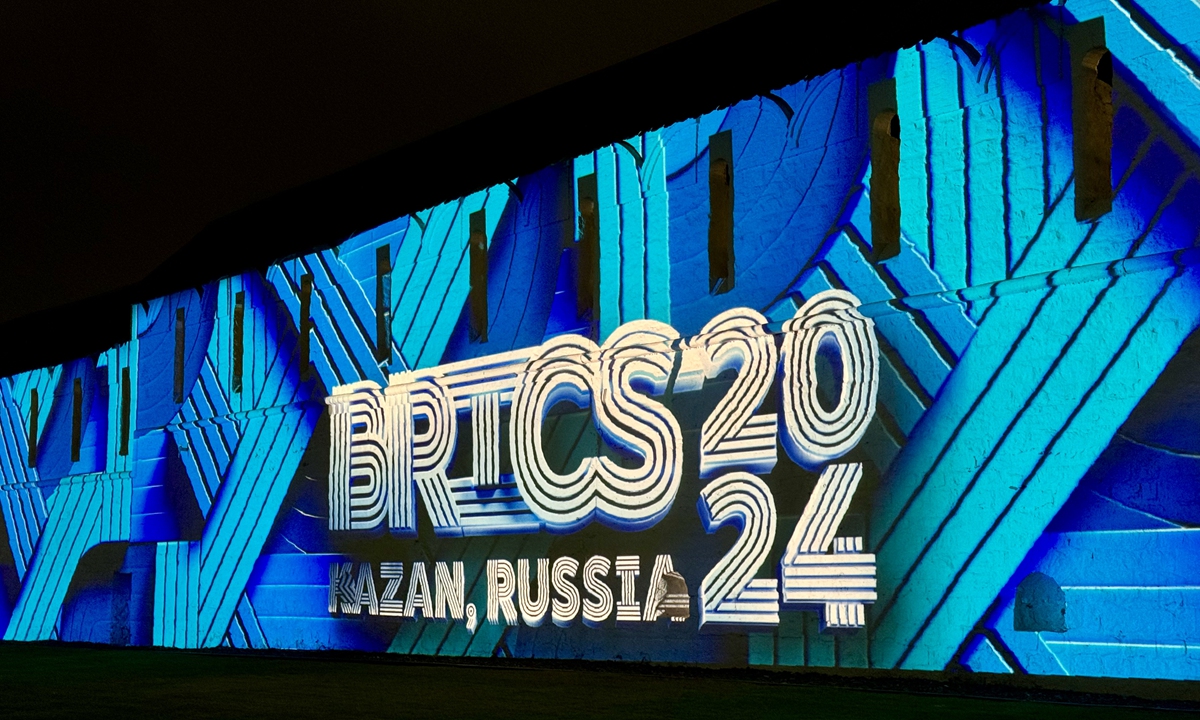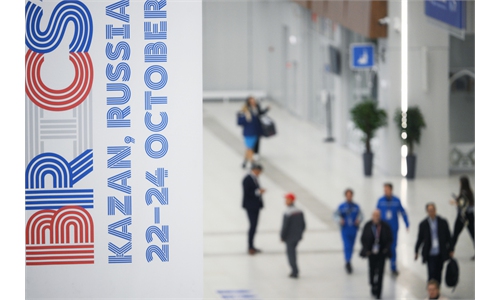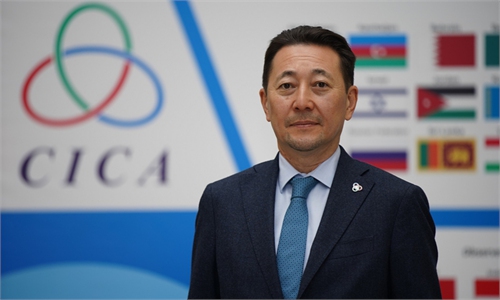
A light show for the BRICS Summit in Kazan, Russia on October 23, 2024. Photo: He Zhuoqian/GT
Editor's Note:
The 2024 BRICS Summit concluded in Kazan, Russia, on Thursday. It is the first summit after its expansion. What should we expect from the results of this gathering? What are the reasons behind the surging willingness from more and more countries to join the BRICS mechanism? The Global Times (GT) invited experts from countries that are either members of BRICS or interested in researching this grouping to share their insights.
In the fourth of this series, Victoria Panova (Panova), head of the BRICS Expert Council-Russia and vice-rector of HSE University, discussed with GT reporter Xia Wenxin about how she evaluates the BRICS' historic expansion, its significance on global governance and China-Russia ties under the BRICS cooperation.
GT: How do you evaluate this year's BRICS Summit? For BRICS, its expansion is a new starting point, with its cooperation mechanism officially entering the era of "Greater BRICS Cooperation." How do you interpret the meaning of "greater" here?
Panova: The 16th BRICS Summit in Kazan is a topical event of global significance that brings together the leaders of almost all BRICS member countries. We can say that 2024 is a landmark year in the history of BRICS. New members officially joined the group on January 1, 2024.
Despite BRICS' decision to take a pause in accepting new members, there are still formats for BRICS Plus countries to be included into the agenda of the growth, and the new members, as regional leaders, will also play a big role in interacting with BRICS Plus. The new BRICS members should gradually integrate into the existing BRICS formats and be committed to the idea of building a multipolar world order. In my opinion, BRICS Plus will involve not only the new category of "partners," but any country that supports BRICS' approach to global governance.
In times of geopolitical tensions and global economic turbulence, BRICS remains a vital platform for mutually beneficial cooperation, advancing a positive agenda toward genuine multipolarity grounded in international law, in particular the UN Charter. One of BRICS' key advantages lies in its flexible format of interaction. The grouping promotes a conflict-free agenda and fosters relations that respect the internal affairs of its members, acknowledging their diverse civilizational and political characteristics without imposing a hierarchy or making distinctions between founding members and newcomers. This inclusive approach allows BRICS to accommodate the unique needs and perspectives of all its members, contributing to its appeal as a collaborative and harmonious platform.
An analysis of national strategies reveals that all BRICS members regard their participation in the grouping as a key foreign policy priority. BRICS membership allows nations to better promote their national interests and enhance their global prestige and influence. Additionally, BRICS plays a significant role in reshaping the international order and global governance to better serve the interests of developing countries, thereby advancing multipolarity and reducing Western dominance.
GT: In your opinion, what new development opportunities has the expansion brought, or will bring, to the cooperation mechanism within BRICS? What role do you think BRICS and its members play in global governance and promoting the interests of the Global South?
Panova: There is no doubt that the expansion has increased the already significant global influence of BRICS. Every new member of BRICS is a major player at the regional level. The expansion has further solidified BRICS' image as a main global representative of the developing world.
Speaking of the role of BRICS in global governance, its reform is central to the BRICS approach. In June, BRICS Ministers of Foreign Affairs adopted a joint statement expressing their support for a comprehensive reform of the UN. BRICS countries also have a universal stance on the advancement of global financial institutions.
GT: Many believe that BRICS represents the voice of the Global South. What challenges are the Global South facing in terms of developing and exploring paths of South-South cooperation? How can we address these challenges?
Panova: BRICS is known as a guarantor of global food and energy security and adherent of technology transfers for equitable development of all, including the World Majority (or Global South and East). Most of these countries still face considerable challenges in areas including healthcare, climate and food. Still, the average level of health security in the World Majority is much lower than in the developed countries. Another burning issue is a climate and fair energy transition problem: Countries from the World Majority are the most affected.
Many of these challenges can only be solved with a technology transfer. Assisting the Global South with technology transfer is a global task that can be accomplished by BRICS, as it positions itself as a leading voice of the World Majority in the global arena: this is why the task of enabling technology transfer to the World Majority perfectly fits it.
Another vital issue is ensuring food security. BRICS, one of the major global players in the field of agriculture, is committed to strengthening agricultural cooperation for the sake of global food security.
GT: What contribution has China made to the BRICS cooperation mechanism? In your opinion, what new dynamics will China inject into BRICS' new era?
Panova: China is one of the most active promoters of inclusiveness and mutual benefit in cooperation. It is an important value that China brings into BRICS. Being the world's biggest manufacturer, China is an essential trading partner for all BRICS states. It is also an important source of foreign direct investment for many BRICS countries.
Apart from that, China is one of the initiators of BRICS cooperation in the outreach format. In 2017, it first introduced the "BRICS Plus" mechanism of cooperation aimed at enhancing dialogue with the countries that were not part of BRICS. Eventually, China was also one of the drivers behind the BRICS expansion. Thanks to joint efforts, today the BRICS family has expanded in size and this is surely just the beginning of a promising future.
GT: This year marks the 75th anniversary of the establishment of diplomatic relations between China and Russia. How do you see the two countries' cooperation under the BRICS mechanism?
Panova: The Russia-China relationship is unique in today's world politics. In 2024, ties between Russia and China maintain a positive upward trend. In BRICS, both countries try to project this constructive approach. For China and Russia, BRICS is a platform of true multilateralism for developing mutually respectful and equal dialogue. Our countries see it as a key mechanism to elevate the voices of the Global South and make the world multipolar, so that no state can dominate and impose its will on any other.
BRICS is also the place where our countries have the opportunity to coordinate policies, have consultations and exchange views on various aspects of the international agenda. As you know, BRICS dialogue encompasses a great variety of issues from international trade and infrastructure to security and humanitarian cooperation.



